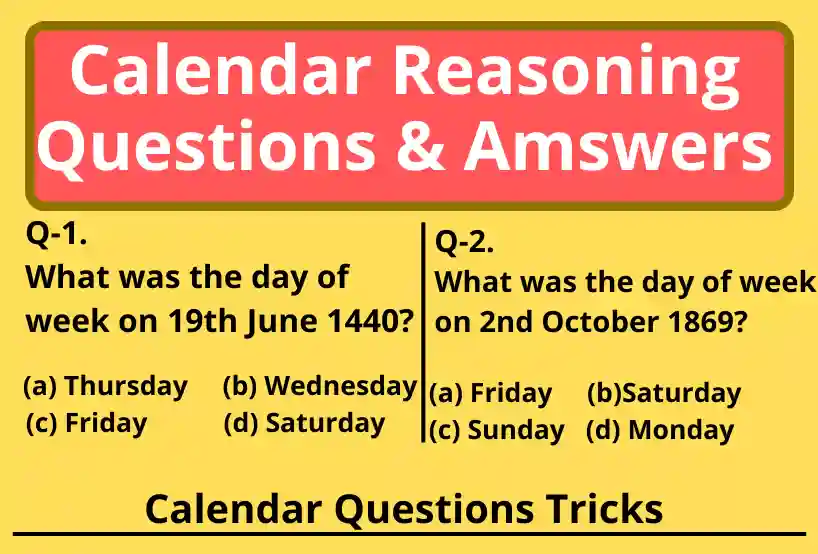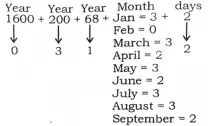Calendar reasoning questions are a type of logical reasoning problem that involves using a calendar to determine dates, days of the week, and other time-related information. In this post we covered important Calendar reasoning questions and answers. Calendar Questions is the most important topic in reasoning which is asked in competitive exams like MPSC, UPSC, Railway, Banking, SSC Exams etc. In this post you get detail information about Calendar Questions Tricks and Tips as well as Calendar Reasoning Questions and answers.

Read In Hindi : Calendar Reasoning Questions in Hindi
Calendar Questions Tricks
- Before attempting calendar reasoning questions, it’s essential to know the basic concepts of calendar.
Basic Concepts of a Calendar
- The concept of ordinary and leap years is fundamental to understanding the calendar system. An ordinary year consists of 365 days, while a leap year has 366 days. The reason for the difference is that a leap year includes an extra day, February 29th, to keep the calendar year synchronized with the astronomical year.
- One useful trick for understanding ordinary and leap years is to note that the division of the number 365 by 7 gives the quotient 52 and remainder 1. This means that an ordinary year has 52 weeks and one extra day, which is referred to as an “odd day” in the context of calendar reasoning questions.
- Similarly, the division of the number 366 by 7 gives the quotient 52 and remainder 2. This indicates that a leap year has 52 weeks and 2 extra days, both of which are considered “odd days” for the purposes of calendar reasoning questions.
2. To find out the day of any date, first find out the total number of odd days and divide it by 7. You can find out the day by the remaining remainder, like
| Remainder | 0 | 1 | 2 | 3 | 4 | 5 | 6 |
| Day | Sun | Mon | Tue | Wed | Thu | Fri | Sat |
By keeping these concepts in mind, you can quickly and easily determine the number of odd days in a given year and use that information to solve more complex calendar reasoning questions.
| Symbol and Notation | Classification Reasoning | Clock Reasoning |
| Seating Arrangement | Analogy Reasoning Hindi | Paper Cutting |
| Order And Ranking | Syllogism Questions Hindi | Number Series |
Calendar Reasoning Questions
1. What was the day of week on 19th June 1440?
(a) Thursday
(b) Wednesday
(c) Friday
(d) Saturday
2. What was the day of week on 2nd October 1869?
(a) Friday
(b) Saturday
(c) Sunday
(d) Monday
3. What was the day of week on 26th November 2008?
(a) Tuesday
(b) Monday
(c) Thursday
(d) Wednesday
4. On what dates of May 1993 did Sunday fall?
(a) 1, 8, 15, 22, 29
(b) 2, 9, 16, 23, 30
(c) 3, 10, 17, 24, 31
(d) 4, 11, 18, 25
5. On what dates of March, 2013 did Wednesday fall?
(a) 6, 13, 20, 27
(b) 5, 12, 19, 26
(c) 4, 11, 18, 25
(d) 7, 14, 21, 28

 Leap year in 39 year = 39/4
= 9 (quotient)
Odd days in 39 year
Leap year in 39 year = 39/4
= 9 (quotient)
Odd days in 39 year  Total E.D./कुल विषम दिन =
0+3+1+3+0+3+2+3+2+3+3+2+2 = 27
But = (27) can never be odd days
= 27/7
= 6 (Remainder)
odd days 6 for ⇒ Saturday
Total E.D./कुल विषम दिन =
0+3+1+3+0+3+2+3+2+3+3+2+2 = 27
But = (27) can never be odd days
= 27/7
= 6 (Remainder)
odd days 6 for ⇒ Saturday
 Total odd days
= 0+1+3+3+0+3+2+1
= 13
13 can never be odd days, Hence again divide by 7 and find Remainder as odd days.
=13/7
= 6 (odd days)
Odd days on Ist May = 1993 = 6
6 for= Saturaday
Than 1 May = Saturday
2 May = Sunday
3 May = Monday
First Sunday of this month is on 2nd day. Then on 2nd, 9th, 16th, 23th, 30th all are Sunday.
Total odd days
= 0+1+3+3+0+3+2+1
= 13
13 can never be odd days, Hence again divide by 7 and find Remainder as odd days.
=13/7
= 6 (odd days)
Odd days on Ist May = 1993 = 6
6 for= Saturaday
Than 1 May = Saturday
2 May = Sunday
3 May = Monday
First Sunday of this month is on 2nd day. Then on 2nd, 9th, 16th, 23th, 30th all are Sunday.
 Total odd days
0+ 1+ 3 + 0 + 1= 5
5 Odd day for = Friday
1st March 2013 = Friday
2nd March 2013 = Saturday
3rd March = Sunday
4th March = Monday
5th March = Tuesday
6th, March = Wednesday
Then Wednesday in March 2013/ = 6th, 13th, 20th, 27th
Total odd days
0+ 1+ 3 + 0 + 1= 5
5 Odd day for = Friday
1st March 2013 = Friday
2nd March 2013 = Saturday
3rd March = Sunday
4th March = Monday
5th March = Tuesday
6th, March = Wednesday
Then Wednesday in March 2013/ = 6th, 13th, 20th, 27th